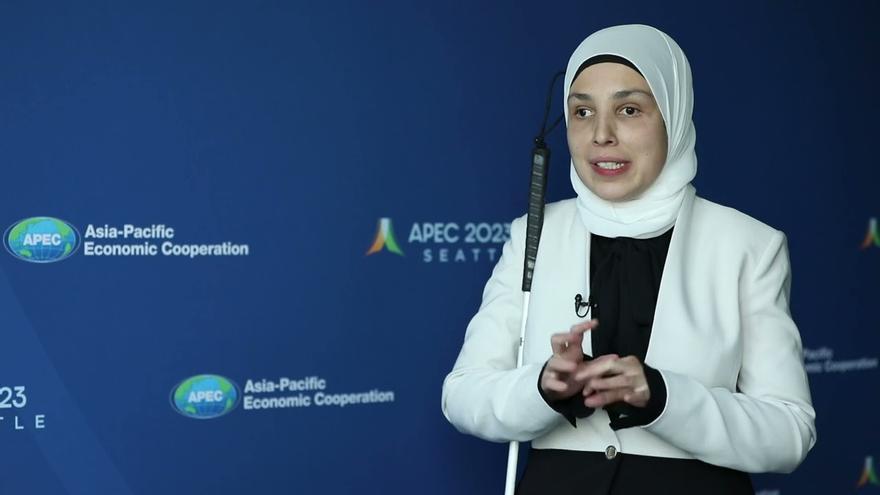
![]() EFE (via 14ymedio), Washington/Havana, 2 February 2024 — The special adviser to the U.S. State Department for the International Rights of Persons with Disabilities, Sara Minkara, met this week with the Cuban Government in Havana, during a visit to the Island, the U.S. embassy in Cuba reported on Thursday. Minkara was in Cuba from last Wednesday to this Monday, the diplomatic delegation said in a statement, without making it clear with which Cuban authorities – and from what ministry – she met.
EFE (via 14ymedio), Washington/Havana, 2 February 2024 — The special adviser to the U.S. State Department for the International Rights of Persons with Disabilities, Sara Minkara, met this week with the Cuban Government in Havana, during a visit to the Island, the U.S. embassy in Cuba reported on Thursday. Minkara was in Cuba from last Wednesday to this Monday, the diplomatic delegation said in a statement, without making it clear with which Cuban authorities – and from what ministry – she met.
During her stay, she held meetings with “representatives of the Government of Cuba, independent Cuban businessmen, alumni of programs sponsored by the Embassy and students of educational institutions in Havana.”
The American official, in office since 2021, “advocated for greater inclusion of Cubans with disabilities in all aspects of society,” added the U.S. embassy
The U.S. official, in office since 2021, “advocated for greater inclusion of Cubans with disabilities in all aspects of society,” added the U.S. embassy. So far, neither the Department of State nor the Government of the Island has reported on her visit.
The team of the Special Advisor for the International Rights of Persons with Disabilities is responsible, among other things, for the “promotion of accountability and capacity building; the promotion of the inclusive democracy of disability; the promotion of the human rights of people with disabilities in countries experiencing crises; and the interruption of the narrative about disability that marginalizes people with disabilities.”
On the same day that the news broke, Cuban dissidents and opponents announced the launch of a “space of activation, action and articulation” to promote and disseminate human rights within the Island, as well as freedoms contained in the country’s Constitution of 2019.
As reported to EFE by its promoters – located on the Island – the initiative is called the Permanent Human Rights Forum and seeks to raise awareness among citizens to demand the enjoyment of the rights and freedoms to which they are entitled by the International Charter of Human Rights and Cuban legislation.
The forum, they add, seeks to be a tool of “public communication between civil society and citizenship,” as well as “the organic and systematic connection of citizenship with the issue of human rights.”
They consider that it is a “pending subject in Cuba” to disseminate and, educate about “each and every one of the rights,” from below, from the citizens and in the communities.” They also believe that the “institutional defense” of rights is fundamental.
“Beyond its rhetoric, the Government contradicts, with its systematic violations, the fundamental issues that have to do with human rights,” says a statement from the promoters of the forum. It emphasizes that “with the exception of the will of the Government, the social, political and institutional conditions to complete this subject are created.”
The statement is signed, among others, by groups such as Diverso, the Council for the Democratic Transition of Cuba (CTDC) and Plataforma Femenina. Its organizers estimated that there were between 100 and 120 of their activists in Havana.
Beyond its rhetoric, the Government contradicts, with its systematic violating practices, the fundamental issues that have to do with human rights
The forum, which claims to learn from the experience of organizations such as the Cuban Committee for Human Rights and the Cuban Commission on Human Rights and National Reconciliation, points out that the 2019 Constitution “recognizes and supports” the “possession, enjoyment and exercise of human rights.”
It intends to work for the dissemination of human and identity rights in the communities and against violence, as well as in the articulation of “legal and constitutional initiatives.”
The forum does not give details about specific actions or how it proposes to carry them out, nor about the means they have to articulate these actions.
The initiative mentions that Cuba has been an almost constant member of the UN Human Rights Council and that in 2008 it signed – although it has not yet ratified – the Covenants on Civil and Political, Social, Economic and Cultural Rights of the International Charter of Human Rights.
It also points out that the Cuban Government made a commitment on this letter by initialing the Political Dialogue and Cooperation Agreement (ADPC) with the European Union (EU) in 2016.
Translated by Regina Anavy
____________
COLLABORATE WITH OUR WORK: The 14ymedio team is committed to practicing serious journalism that reflects Cuba’s reality in all its depth. Thank you for joining us on this long journey. We invite you to continue supporting us by becoming a member of 14ymedio now. Together we can continue transforming journalism in Cuba.
